Please return all garden tools by Saturday, Nov. 11, the last day of the Fall 2017 Garden Tool season.
Honoring Veterans from Arlington and Beyond
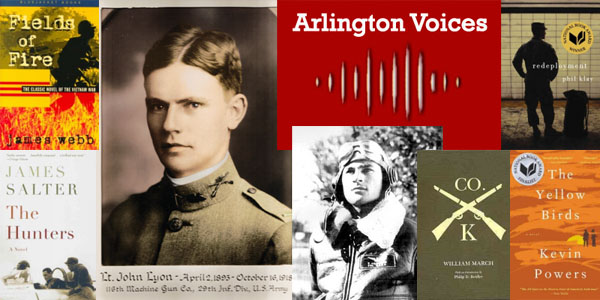
Join us this November as We Honor the Stories of Veterans Throughout Our Community
Film and Speaker Series – Join us all month for Exploring World War 1
Documenting Doughboys – On Tuesday, Nov. 28, learn how researchers can use records available at the National Archives to document evidence of WWI veterans despite the 1973 fire at the National Military Personnel Records Center in St. Louis, MO, that destroyed WWI military service records.
Visit the Face of War exhibit at Central Library, featuring Arlington’s WWI soldiers. And listen to the oral history of Tom Oxendine, long time Arlington resident and the first Native American Navy pilot in World War II.
Check out our book lists:
- Veterans Write About War – Books by soldiers turned author.
- The Transition from Military to Civilian Life – Books on careers, life, college, and adjustments for veterans transitioning from military to civilian life.
- Veterans Day – Books and films about the experience of veterans.
- Love and War – Romance Novels featuring veterans.
And browse books on display featuring soldiers from military engagements throughout US history:
- Aurora Hills Branch Library – Vietnam War
- Central Library – World War I, Spanish American War and other conflicts
- Cherrydale Branch Library – War of 1812
- Columbia Pike Branch Library – Civil War
- Glencarlyn Branch Library – Korean War
- Plaza Branch Library – Current Conflicts
- Shirlington Branch Library – World War II
- Westover Branch Library – American Revolution
Library Closed Friday, Nov. 10 for the Observation of Veterans Day [more]
All Arlington Public Library locations will be closed Friday, Nov. 10 for the observation of Veterans Day.
The Library will be open on our regular schedule on Saturday, Nov. 11.
Veterans Day is a remembrance of all U.S. military veterans – past and present. It is celebrated every November 11th, and has been a federal holiday since 1926.
See the full County schedule for Veterans Day on the County website.
Exploring World War 1: Faces of War
Honoring Arlington’s Veterans
Among the plaques that constitute the Arlington County War Memorial at 3140 Wilson Boulevard is one that honors thirteen Arlington County soldiers and sailors who made the ultimate sacrifice while serving in World War I.
An exhibit featuring their stories will be on display in the Central Library lobby this November, in honor of the 100th Anniversary of World War I.
One of those men was John Lyon, son of Arlington developer, newspaper publisher and lawyer Frank Lyon and his wife Georgie Hays Wright Lyon, who was born in Ballston in 1893.
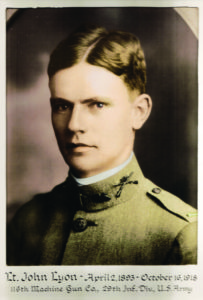
John Lyon: April 2, 1893 – Oct. 15 1918
After attending the University of Virginia and Georgetown University, Lyon began his World War I service in May of 1915 by volunteering as a Hospital Corps ambulance driver in France, predating the United States entry into the war by almost two years. After arriving in France, he was assigned to Belgium, where he transported wounded troops from field hospitals to larger facilities further from the battlefields.
After returning to the U.S. in December of 1915, he enlisted in the U.S. Army and was stationed on the Mexican border in Cameron County, Texas for the next six months.
Under the leadership of General John J. Pershing, Lyon was a machine gunner in the 29th Infantry Division as part of the American Expeditionary Force and was deployed to Europe on April 6, 1917, after the United States’ entry into World War I.
After returning to France, he was promoted from sergeant to lieutenant of the 166th Infantry of the 29th Division and quickly saw front line duty in the trenches. In September of 1918, the 29th Division became part of the Muese-Argonne Offensive, the final Allied offensive of World War I, which lasted 47 days, claiming 28,000 German and 26,277 American lives.
Lieutenant Lyon was a casualty of the Muese-Argonne Offensive on October 15, 1918, giving his own life to attend to a wounded comrade, Major H.L. Opie.
Opie wrote of Lyon’s valor in a letter to the Lyon family:
“Lieutenant Lyon had the guns of his platoon posted in partial shelter on my left, against counter attack. He saw me fall wounded and leaving his guns, ran directly to my assistance in the face of certain death. He was killed by the fire of an enemy machine gun and fell within a few feet of me.”
On April 20, 1920, Lieutenant Lyon was posthumously awarded the distinguished Service Cross, becoming Arlington’s most decorated World War I soldier. Arlington VFW Post 3150 was named after him on November 11, 1934.
The family name remains highly visible in present day Arlington County through Frank Lyon’s many contributions, including his development of the Lyon Park and Lyon Village neighborhoods.
The exhibit also includes biographical information on:
Robert Bruce, Frank Edward Dunkin, Oscar Lloyd Housel, Ralph Lowe, Arthur C. Morgan, Irving Thomas Chapman Newman, Frederick Wallis Schutt, Henry Smallwood, Edward J. Smith, Harry R. Stone, Harry Emory Vermillion, and Archie Walters Williams.
In assembling this exhibit, the Center for Local History librarians would like to acknowledge a very helpful article by Annette Benbow in the Arlington Historical Society Magazine (V15, #2, 2014), which gives a comprehensive description of the thirteen men from Arlington who died in WWI.
Arlington Wins Top Honors for Energy Lending Library
On October 25, Arlington County was presented with a 2017 Achievement award by the VA Association of Counties, for the Energy Lending Library.
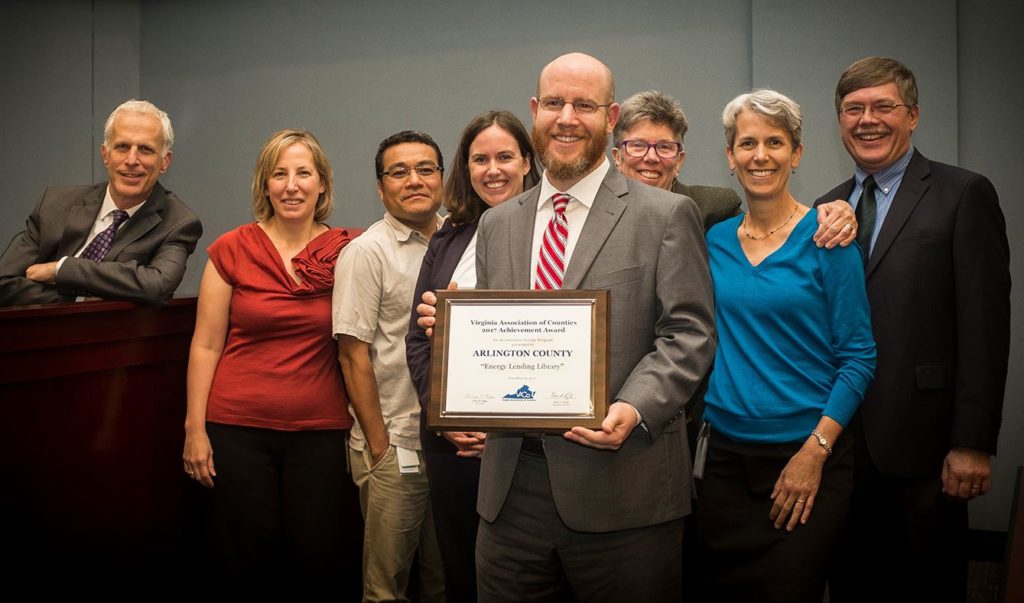
County Manager Mark Schwartz Library Director Diane Kresh stand with Library and AIRE staff members who helped make the Energy Lending Library possible.
The Energy Lending Library is the result of a great partnership between the Library and Arlington’s Initiative to Rethink Energy (AIRE). The goal is to increase energy awareness and to encourage Arlington residents to make their homes more energy efficient.
The Energy Lending Library has received national, state and regional awards from the Urban Libraries Council, the Metropolitan Washington Council of Governments, and the Virginia Association of Counties (VACO).
Library Director Diane Kresh describes the value of the program, saying:
“The Energy Lending Library allows Arlington citizens to interact with their library in a new and unexpected way while learning about energy efficiency opportunities and solutions in their home. The program has brought new users to the library and sparked a dialogue in the community surrounding energy conservation.”
 Items in the Energy Lending Library include thermal cameras, electricity usage monitors, LED bulb sampler kits, and of course, curated book lists.
Items in the Energy Lending Library include thermal cameras, electricity usage monitors, LED bulb sampler kits, and of course, curated book lists.
These tools are available for patrons to borrow for free with their Arlington Public Library card.
Oral History: Interview with Native American Navy Pilot Thomas Oxendine
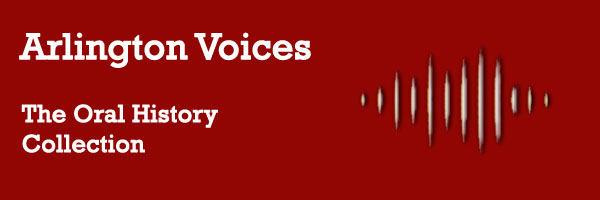
Native American Experience in the U.S. Military
Thomas Oxendine, from Pembroke, North Carolina, became the first Native American Navy Pilot when he served in World War II.
Oxendine had an illustrious career as a Navy pilot, earning the Distinguished Flying Cross for landing at sea and under gunfire to make a rescue. After 29 years in the Navy, Oxendine transitioned to civilian life as the head of public information with the Bureau of Indian Affairs and settled down in Arlington, Virginia, where he lived until his death in 2010. His oral history interview sheds light into the complex history of Native American and United States Federal Government relations in the 20th century, and is a wonderful source in this time of reflection on Veteran, Native American, and United States founding history.
In this clip, Thomas Oxendine describes the segregation of Native Americans in the US Military, and gives an account of his famous rescue on Yap Island.
NARRATOR: Thomas Oxendine
INTERVIEWER: Joe B. Johnson
DATE: May 22, 2007
Transcript:
TO: Well, as I was just pointing out my background is a little unusual in that I am a Lumbee Indian, born on a farm near Pembroke, North Carolina.
In 1941 – very unusual. There was an enterprising person who had a flying school in Lumberton, North Carolina, Horace Barnes. And he petitioned the government to do a study by training ten Indians to fly, and do a study similar to what they were doing with blacks down at Tuskegee, Alabama. So I was fortunate enough at age eighteen to get a license to fly. So at the time of Pearl Harbor I already could fly and went down to join up in January, and joined the Navy and became the first American Indian to go through Navy flight training.
You may have an interest in how that came about, because the policies of government during the days of segregation were a little unusual, in that the way the Armed Forces dealt with segregation, the Army only segregated black people. They had all black people doing what they did in the Army, they did it in a segregated unit. There were no restrictions on Indians in the Army. They could attain any level they had the skills and qualifications. So it only applied to blacks.
At the same time over in the Navy, the Navy restricted their officer corps to Caucasians. Indians could be any of the enlisted grades but not an officer, and blacks could only be steward’s mates. Again, that’s not good or bad, that’s flat out the way it was. In fact, the application for me signing up for the Navy had three categories: they were Caucasian, Negro, others. I don’t know who all the others were but Indians were in the “others.” So the qualifications for a naval officer was Caucasian and certain age. I think it was 19-26.
I found out the Navy has a problem with me in that at the time I applied, the Navy had enlisted pilots called NAPs or Naval Aviation Pilots. The Army had Flying Sergeants and what they did is: they did routine maintenance flights, ferried airplanes and what have you. But the war had just broken out and the Navy did away with the enlisted program. So I’m not restricted from entering flight training.
However, if they put me in, by the time I get to the other end, completion, there is no enlisted program. So it took a couple of months and finally permitted me to enter and then I got all kind of publicity as the first American Indian to go through Navy flight training. But that was kind of a fluke, and I don’t know of any others who came in until President Truman integrated the Armed Forces in 1947.
JJ: All right. That’s an unusual way to get through, and you then went through the training and went on to be an active aviator and had a career.
TO: Right.
JJ: You made at least one rescue?
TO: Yes, on July 24, 1944. It happened at Yap Island. We got a message that there were three downed pilots, in too close to the beach for their submarines to pick up. We were one hundred or so miles away, and flew in to make that rescue. The first pilot was going without anyone in his backseat and we spotted the raft, and he landed and made that recovery. They said there was a third pilot crew member in the water also, but without a life raft, and that is very difficult from being airborne to locate a person who is just in there with a life jacket under enemy gun fire.
But while that rescue is taking place by the other aircraft, I finally spotted him, and I went in to make the rescue, and the gun fire got really heavy and the air group commander said: “Do not land, do not land,” but I had already made up my mind I would not take my eyes off this person.
So I landed and went in and picked him up and leveled out and avoided the gunfire. I didn’t get hit but had splashes all around while I’m making that. So I kind of wiped my brow and said” Thank goodness I was able to do that.”
You can find Thomas Oxendine’s interview in its entirety in the Center for Local History – VA 975.5295 A7243oh ser.3 no.207
The goal of the Arlington Voices project is to showcase the Center for Local History’s oral history collection in a publicly accessible and shareable way.
From June 2017 – May 2018, we will post one oral history clip and transcript each month, focusing on Arlington’s history, culture and identity.
What is the oral history collection?
Oral history is a popular method of research used for understanding historical events, actors, and movements from the point of view of people’s personal experiences.
The Arlington Public Library began collecting oral histories of long-time residents in the 1970s, and since then the scope of the collection has expanded to capture the diverse voices of Arlington’s community. In 2016, staff members and volunteers recorded many additional hours of interviews, building the collection to 575 catalogued oral histories.
To browse our list of narrators indexed by interview subject, check out our community archive. To read a full transcript of an interview, visit the Center for Local History located at Central Library.
Code Girls and Arlington Hall: A Diverse History
From Girls School to Cryptanalysis Hub
Author Liza Mundy, who did research for her book "Code Girls" in our Center for Local History, spoke at Central Library on Thursday, Oct. 26 at 7 p.m.
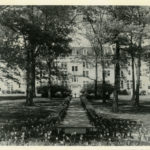
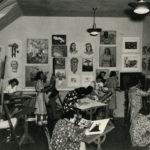
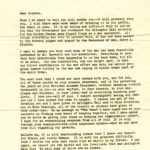
From 1927 to 1942, Arlington Hall was an all-female Junior College with a four-year high school department. It was a boarding school for high school and junior college students and was a “fully accredited school.”
The college offered courses in music, art, and drama, plus training in home economics, secretarial skills, and physical education.
In June 1942, the US Government took over Arlington Hall as their new location for military intelligence and cryptanalysis work.
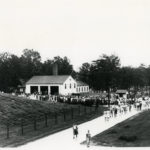
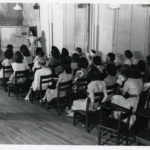
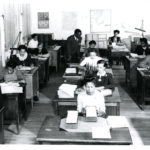
Arlington Hall Station, as it was known during the military’s occupation, became a central hub for the WACs – Women’s Army Corps– and over 1,000 women worked and thrived during wartime America at the complex. Many of these women became “Code Girls” – cryptanalysts responsible for the decoding and deciphering of the Japanese Imperial/Diplomatic code, known as “Purple.”
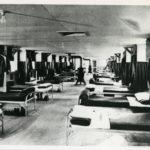

After WWII had ended, the National Security Agency called Arlington Hall Station home for a few years, and until the late 80s, several intelligence think-tanks and divisions remained at Arlington Hall. Today, in 2017, Arlington Hall remains a federal instillation and a training center.
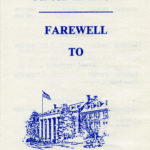
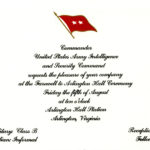
To learn more about Arlington Hall – and all things Arlington, please come visit the Center for Local History at the Arlington Central Library.
For more information regarding the materials and collections available for research, please contact the Center for Local History at 703-228-5966.
Central Library to Remain Open During Construction
Oct. 23, 2017
Work Set to Begin this Fall on Major Upgrades
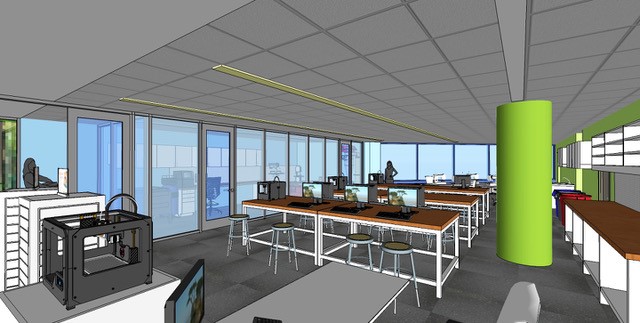
Architect’s rendering of the 2nd Floor Maker Lab
Renovations are set to begin in the fall of 2017 and will last up to 12 months. The Library will remain open during regular business hours.
Design features include new meeting rooms, a multi-purpose maker lab and updated ‘Tech-Central’ area.
“The Central Library upgrades are welcome and necessary,” says Library Director Diane Kresh. “We are committed to creating lively and collaborative spaces to meet the evolving needs of our community.”
Building upgrades and design elements include:
- 3 new meeting rooms and updated reading room area on the 1st floor
- New multi-purpose technology and maker lab equipped with a tool and storage room, work benches, design areas and computer stations on the 2nd floor
- Redesigned public PC stations
- New reference desk stations, furniture and media shelving
- Relocation of pick-up area for holds
- Book store for Friends of the Arlington Public Library
- Energy efficient electrical fixtures and new power supply outlets for public use
- Semi-transparent glass walls, private yet contemporary
- ADA upgrades: redesign of ramp in front of the main parking lot and addition of protective railing underneath the staircase of the 1st floor
The project’s goals were informed by public work sessions and surveys around “The Future of Libraries” in 2011/2012.
Central Library Set to Receive Major Upgrades [News Release]
Oct. 21, 2017 News Release
Design features include new meeting rooms, a multi-purpose maker lab and updated ‘Tech-Central’ area.
- County Board awarded contract to TMG Construction Corporation for Central Library upgrades.
- Construction is set to begin this fall.
- Library to remain open throughout year-long project.
Read the full Library news release [PDF].
Read the County news release on the County website.
Visit the Central Upgrades page for more information and the latest updates.
New Digital Collection to Celebrate Arlington Women [News Release]
Arlington Public Library will launch a new digital collection of Arlington women and their achievements in March 2018.
The Center for Local History’s (CLH) Community Archives contains many collections pertaining to women’s history and consequently the history of Arlington County.
“Many of these women were not well known, however their contributions to education, civil rights, conservation and healthcare aided in the development of this community from a rural to suburban county, and Arlington would not be the same today without their achievements,” said Library Director Diane Kresh.
The CLH will follow their journey over the next two years by examining documents, photographs, scrapbooks and oral histories culled from the archival collections, all of which will be digitized and made available online as a celebration of the accomplishments of these women.
This new digital collection will be introduced during Women’s History Month in March 2018 with a second and final installment in March 2019.
A related author event will be held at Central Library on October 26, 2017. Author Liza Mundy will talk about her new book: “Code Girls: The Untold Story of the American Women Code Breakers of World War II”. In conjunction with this event the CLH will present an exhibit of material from the community archives including historic photos of Arlington Hall, the former girls’ school which became the headquarters of the U.S. Army’s Signal Intelligence Service.
The CLH continually seeks community donations and oral histories, particularly as they relate to Arlington’s past through the achievements of its women. Contact the CLH at 703-228-5966 or localhistory@arlingtonva.us.
This digital access project will be completed using FY2018 funding in the Department of Libraries budget dedicated to increasing public access to government records and archival materials.
The Center for Local History at Arlington Public Library is committed to collecting, preserving, and sharing the history of Arlington County. To learn more about the Center for Local History, visit http://library.arlingtonva.us/center-for-local-history.